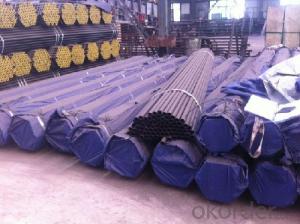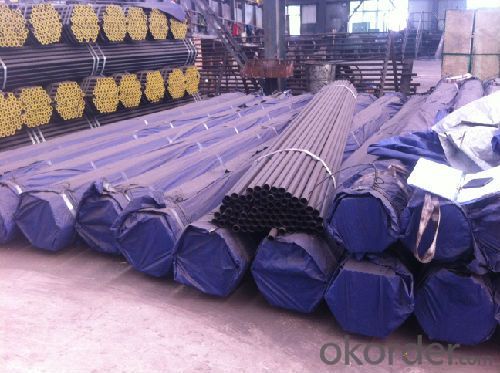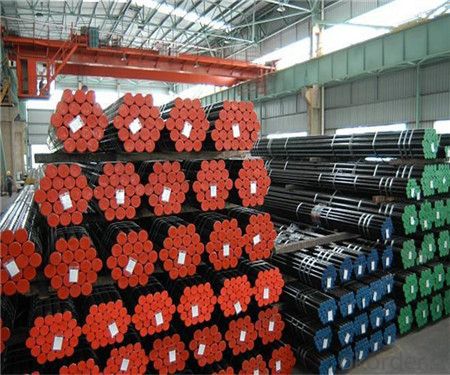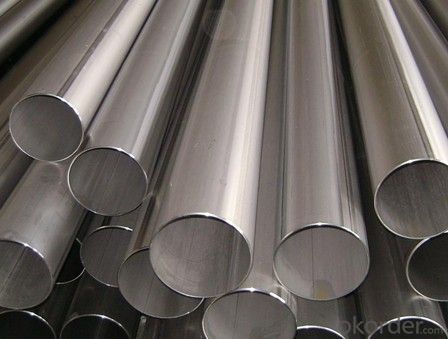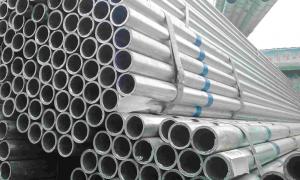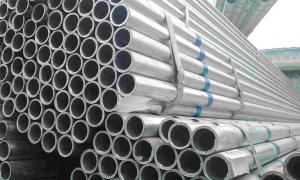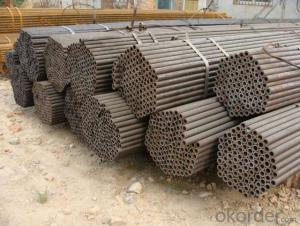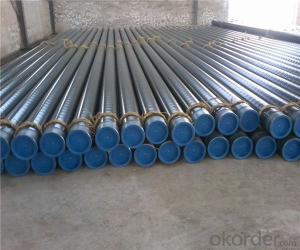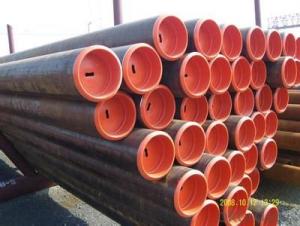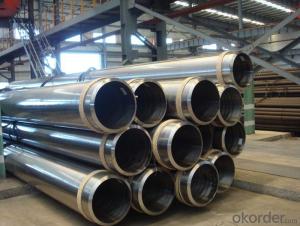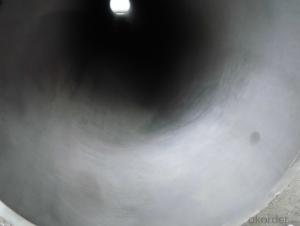Model and Diverse Varieties Complete Seamless Steel Pipe Waiting for Your Cooperation
- Loading Port:
- China main port
- Payment Terms:
- TT or LC
- Min Order Qty:
- 5 m.t.
- Supply Capability:
- 8000 m.t./month
OKorder Service Pledge
OKorder Financial Service
You Might Also Like
Seamless steel pipe with hollow section, used as a large number of pipe conveying fluid, such as oil, natural gas, coal gas, water and some solid materials such as pipelines. Compared with steel and round steel solid steel, the torsional strength of bending is same, the weight is light, is a kind of economic section steel, widely used in the manufacture of structural parts and mechanical parts, such as the oil pipe, automobile transmission shaft, the bicycle frame and steel construction with scaffold with steel pipe manufacturing annular parts, can improve the the material utilization rate, simplify the manufacturing process, material saving and working hours, has been widely used in steel pipe manufacturing
Product Description:
1. Commodity Name: Seamless steel pipe
2. Standard: API,GB,ASTM,ASME,DIN
3. Quality grade: 10#, 20#, A106B, A53B,Q235, Q345, ST37-2, ST 45, ST52.etc.
4. Dimension:
OD: 1/2"-24"
WT: 8-80mm,
length: 5.8m,6m,8m,9m,12m
5. Technique: Hot Rolled/Cold Rolled/ Cold Drawn
6.Application
Main standards of medium thickness pipe for machining are API5L,JIS G3441/3444/3445,GB8162,the pipes are applied into tubular machinery parts processing.
7. Payment Terms: L/C , T/T
8.Packing and shipment
As per customers' requirements, it can also bepackagesd as beveled ends, typed marking, black painting, plastic caps protection,woven bags packing; Hexagonal package.
For 20" container the max length is 5.8m; For 40" container the max length is 11.8m. Other options are available based on customer requests. Please discuss when placing orders.
FAQ of Seamless Pipe :
①How is the quality of your products?
Our products are manufactured strictly according to national and internaional standard, and we take a test on every pipe before delivered out. If you want see our quality certifications and all kinds of testing report, please just ask us for it.
Guaranteed: If products’ quality don’t accord to discription as we give or the promise before you place order, we promise 100% refund.
②How about price?
Yes, we are factory and be able to give you lowest price below market one, and we have a policy that “ for saving time and absolutely honest business attitude, we quote as lowest as possible for any customer, and discount can be given according to quantity”,if you like bargain and factory price is not low enough as you think, just don’t waste your time.Please trust the quotation we would give you, it is professional one.
③Why should you chose us?
Chose happens because of quality, then price, We can give you both.Additionally, we can also offer professional products inquiry, products knowledge train(for agents), smooth goods delivery, exellent customer solution proposals.Our service formula: good quality+good price+good service=customer’s trust
SGS test is available, customer inspection before shipping is welcome, third party inspection is no problem.
Any question, pls feel free to contact us !
Seamless Pipe Images:
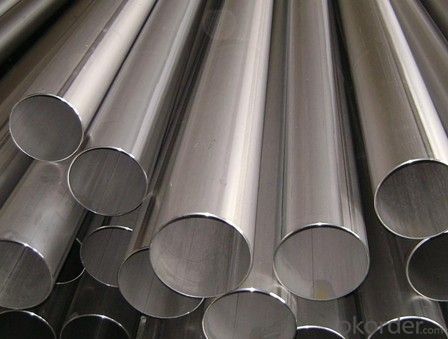
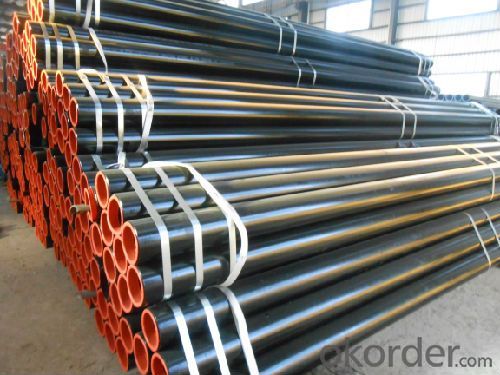
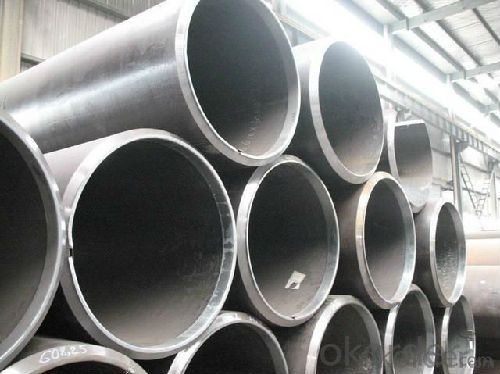
- Q: How are steel pipes marked for identification and traceability?
- Various methods are utilized to mark and trace steel pipes for identification purposes. One prevalent technique involves the use of permanent markers or paint. These markings typically encompass vital information such as the manufacturer's name or logo, the pipe's dimensions and specifications, and the production date or batch number. Aside from surface marking, steel pipes may also be identified through the utilization of tags or labels. These tags are commonly constructed from durable materials such as metal or plastic and are securely affixed to the pipe. They entail comprehensive details regarding the pipe, including its unique identification number, material composition, and any pertinent certifications or standards it adheres to. Another method employed for identification and traceability encompasses the application of barcodes or QR codes. These codes can be scanned using specialized equipment or mobile applications, instantly granting access to comprehensive information concerning the pipe's origin, production process, and quality control measures. Barcodes and QR codes offer a more efficient and automated means of monitoring and tracing steel pipes throughout their lifespan. Moreover, some steel pipes may feature embossed or engraved markings directly on their surface. These markings are typically etched into the metal and possess the ability to withstand harsh conditions, ensuring long-term visibility and legibility. The ultimate objective of marking steel pipes is to guarantee their accurate identification and traceability throughout their lifespan. This aids in quality control, maintenance, and inspection procedures, as well as ensuring compliance with regulatory requirements. Clear and permanent markings enable manufacturers, suppliers, and users to effortlessly track and trace the history and specifications of steel pipes, facilitating better management and accountability in diverse industries such as construction, oil and gas, and infrastructure development.
- Q: What material is RHS in the steel tube?
- RHS is a rectangular hollow section steel. The RHS structure represents a rectangular hollow section steel.
- Q: Are steel pipes suitable for structural applications?
- Yes, steel pipes are suitable for structural applications due to their high strength, durability, and versatility. They are commonly used in various construction projects such as buildings, bridges, and infrastructure due to their ability to bear heavy loads, resist corrosion, and withstand extreme weather conditions.
- Q: How are steel pipes handled and transported safely?
- Steel pipes are handled and transported safely through a combination of proper lifting and handling techniques, secure packaging, and appropriate transportation equipment. Before transportation, pipes are bundled, strapped, or put into crates to prevent any movement or damage during transit. Special lifting equipment such as cranes or forklifts are used to handle them, ensuring that proper weight distribution and balance are maintained. Additionally, securing the pipes to flatbed trucks or using specialized pipe carriers prevents them from rolling or shifting during transportation. Regular inspections, adherence to safety regulations, and trained personnel play a vital role in ensuring the safe handling and transportation of steel pipes.
- Q: How do steel pipes handle ground freezing and thawing?
- Steel pipes are highly resistant to the effects of ground freezing and thawing. The inherent strength and durability of steel make it an ideal material for handling these thermal cycles. When the ground freezes, steel pipes are able to withstand the expansion forces exerted by the freezing water without any significant damage. The structural integrity of steel pipes remains intact even under extreme cold conditions. During thawing, steel pipes also fare well due to their ability to contract without compromising their strength. The material's flexibility ensures that it can accommodate the contraction of the ground without causing any structural issues. Steel pipes do not crack or break when exposed to the rapid temperature changes associated with thawing. Furthermore, steel pipes have a smooth internal surface, which reduces the risk of ice formation and subsequent blockages. This is particularly important in areas with frequent freezing and thawing cycles, as it helps to maintain a consistent flow of fluids or gases through the pipes. In summary, steel pipes are an excellent choice for handling ground freezing and thawing. Their strength, durability, and ability to withstand temperature fluctuations make them a reliable and long-lasting solution in such environments.
- Q: How are steel pipes used in the manufacturing of agricultural machinery?
- Steel pipes are commonly used in the manufacturing of agricultural machinery for various purposes such as structural support, fluid transportation, and protection. They are utilized to create the framework and chassis of the machinery, providing strength and durability. Steel pipes are also used to transport fluids such as fuel, water, and chemicals throughout the machinery. Additionally, steel pipes can be used to protect vulnerable components from external elements, ensuring the longevity and reliability of the agricultural machinery.
- Q: Are steel pipes suitable for use in pharmaceutical industries?
- Yes, steel pipes are suitable for use in pharmaceutical industries. Steel pipes are known for their durability, strength, and resistance to corrosion. These qualities make them ideal for transporting chemicals, gases, and liquids safely and efficiently within pharmaceutical facilities. Additionally, steel pipes can be easily cleaned and sanitized, ensuring the maintenance of high hygienic standards required in the pharmaceutical industry.
- Q: What is the buckling type thin-wall steel pipe? What is a tight set of thin-walled steel tubes? What's the difference between the two?
- The wire pipe thread (box, cup lock fastening points) (JDG) and buckling type (KBG) two. Products are made of high-quality steel pipe, through precise stamping molding, supply pipe and terminal box connection. The nut is hexagonal, and the convex point is punched at the six corner so as to form a good multi-point contact after being connected with the junction box.
- Q: Are steel pipes suitable for underground sewage systems?
- Yes, steel pipes are suitable for underground sewage systems. They are durable, strong, and resistant to corrosion, making them a reliable choice for carrying sewage underground. Additionally, steel pipes have a long lifespan and can withstand the pressure and weight of the surrounding soil, making them a suitable option for underground sewage systems.
- Q: How seamless steel tube is formed?
- Overview of two kinds of steel pipe process:1, cold drawing (rolling) seamless steel pipe: round tube to heating to perforation, annealing, pickling, leading to oil (copper), multi pass drawing (Leng Zha), the blank pipe, heat treatment, straightening, pressure test (testing), marking and warehousing.2. Hot rolling (extrusion seamless steel tube): round tube billet, heating, piercing, three roll cross rolling, rolling or extrusion, removal of pipe, sizing, reducing (diameter or reducing), cooling, blank tube, straightening, water pressure test (or flaw detection), marking and warehousing.
Send your message to us
Model and Diverse Varieties Complete Seamless Steel Pipe Waiting for Your Cooperation
- Loading Port:
- China main port
- Payment Terms:
- TT or LC
- Min Order Qty:
- 5 m.t.
- Supply Capability:
- 8000 m.t./month
OKorder Service Pledge
OKorder Financial Service
Similar products
Hot products
Hot Searches
Related keywords
